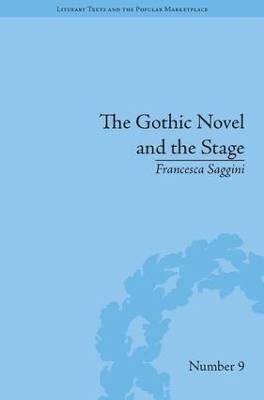
The Gothic Novel and the Stage
Pickering & Chatto (Publishers) Ltd (Verlag)
978-1-84893-414-6 (ISBN)
In this ground-breaking study Francesca Saggini explores the relationship between the late eighteenth-century novel and the theatre, arguing that the implicit theatricality of the Gothic novel made it an obvious source from which dramatists could take ideas. Similarly, elements of the theatre provided inspiration to novelists.
Saggini opens her study with a very useful and persuasive overview of the themes and forms of Gothic drama. In her view, stage appropriation is the textual threshold in which novelistic and dramatic/ performative texts overlap on and disseminate through each other. She examines in details the use of three specific aspects of Gothic dramatic language as recorded by both novel and drama: music, lighting, and scene design. The following chapters, informed by semiotic and narrative theory, closely examine the stage appropriations respectively in and of the Gothic novel, particularly, though not exclusively, the representation of the supernatural in Ann Radcliffe and Matthew G. Lewis. Boaden’s successful Gothic drama Fontainville Forest challenges a central aspect of Radcliffe’s poetics: her reliance on the so-called explained supernatural and puts it context by looking at contemporary stage presentations of the supernatural as offered for instance in Hamlet. The final part of the study frames Lewis’s representation of the supernatural in The Monk within the contemporary mechanics of staging and discusses the novel in relation to contemporary stage presentation and in the context of Romantic harlequinades and spectacular visual exhibits.
Saggini makes a convincing argument for a transmedial and highly cooperative reading of Gothic texts and spectacles. Her approach does not seek to displace the novel or ‘the text’ from modern perceptions of the Gothic, but wants to open the genre to plural and anti-hierarchical forms of reading and to recognise its resourcefulness in appropriating theatrical techniques. The concept of ‘stage appropriation’ gives equal epistemological status to both verbal and non-verbal sign system, and this strategy allows for a holistic approach to the Gothic and an analysis of several literary-cultural formations as correlated, rather than discrete.
Francesca Saggini is Associate Professor of English Literature at the Università della Tuscia (Viterbo), Italy. She is the award-winning author of Backstage in the Novel: Frances Burney and the Theater Arts (Walken Cowen Memorial Prize for an outstanding work in eighteenth-century studies, 2012) and La messinscena dell’identità. Teatro e teatralità nel romanzo inglese del Settecento (Premio ‘Mario di Nola’ awarded by the Accademia Nazionale dei Lincei, 2005). Francesca’s main field of research is popular culture, in particular adaptations and afterlives. She has published essays and chapters on, among others, Inchbald, Austen, the castrati in Europe, the eighteenth-century on film, Dickens, Victorian melodrama, Stocker, Doyle, Stevenson, vampire fiction and the representation of ghosts. Recent publications include Gothic Frontiers (co-edited with Glennis Byron, 2012), Housing Fictions. The House in Writing and Culture, 1950 to the Present (co-edited with Janet Larson and Anna Enrichetta Soccio, 2012), The House of Fiction as the House of Life. Representations of the House in Literature and Culture, Richardson to Woolf (co-edited with Anna Enrichetta Soccio, 2012), two volumes on crime fiction (both co-edited with Maurizio Ascari, 2011 and 2012) and the first critical edition of Miss Tully, Narrative of a Ten Years’ Residence at Tripoli in Africa (2014). Her forthcoming book, Il gotico, is due out with Carocci in 2016. Francesca is the recipient of a Visiting Fellowship at Lucy Cavendish College (Cambridge) during which she will study Frances Burney’s tragic works.
Acknowledgements List of Figures and Tables Introduction: The Transforming Muses: Theorizing Stage Appropriation Part One – The Gothic Stage 1. A Stage of Tears and Terror: Introducing the Gothic Stage 2. Uncloseting the Gothic Monster 3. An Overview of Critical Responses to English Gothic Theater 4. A Chronology of the Gothic Drama 5. The Gothic Drama. A Survey of Criticism Part Two – Performing Stage Appropriation in the Romantic Era: The Languages of the Stage and the Page 6. An Evening at the Theatre: Performance, Intertheatricality, Infratheatricality 7. A Pathognomic Theatre: The Body of the Actor and Contemporary Theories of Acting 8. Intersemiotic Translation and Appropriation: An Exploration of Sound, Scenery, Lighting and Costume in Gothic Dramas and Novels 9. Surface vs Depth: Staging the Signifiers of the Gothic Part Three – Practising the Appropriation of the Gothic Stage: Romantic Case Studies 10. ‘To Ears of Flesh and Blood’: Ann Radcliff e’s Stage Hauntings 11. Change, Transformation, Spectacle: The Monk and the Forms of Georgian Scenic Spectacle 12. On the Re-Mediation of Gothic Dramas: The Gothic Stage and the Gothic Trade Afterword Works Cited Notes Index
| Erscheint lt. Verlag | 1.5.2015 |
|---|---|
| Reihe/Serie | Literary Texts and the Popular Marketplace |
| Verlagsort | London |
| Sprache | englisch |
| Maße | 156 x 234 mm |
| Gewicht | 589 g |
| Themenwelt | Kunst / Musik / Theater ► Theater / Ballett |
| Geisteswissenschaften ► Sprach- / Literaturwissenschaft ► Anglistik / Amerikanistik | |
| Geisteswissenschaften ► Sprach- / Literaturwissenschaft ► Literaturwissenschaft | |
| ISBN-10 | 1-84893-414-9 / 1848934149 |
| ISBN-13 | 978-1-84893-414-6 / 9781848934146 |
| Zustand | Neuware |
| Haben Sie eine Frage zum Produkt? |
aus dem Bereich


